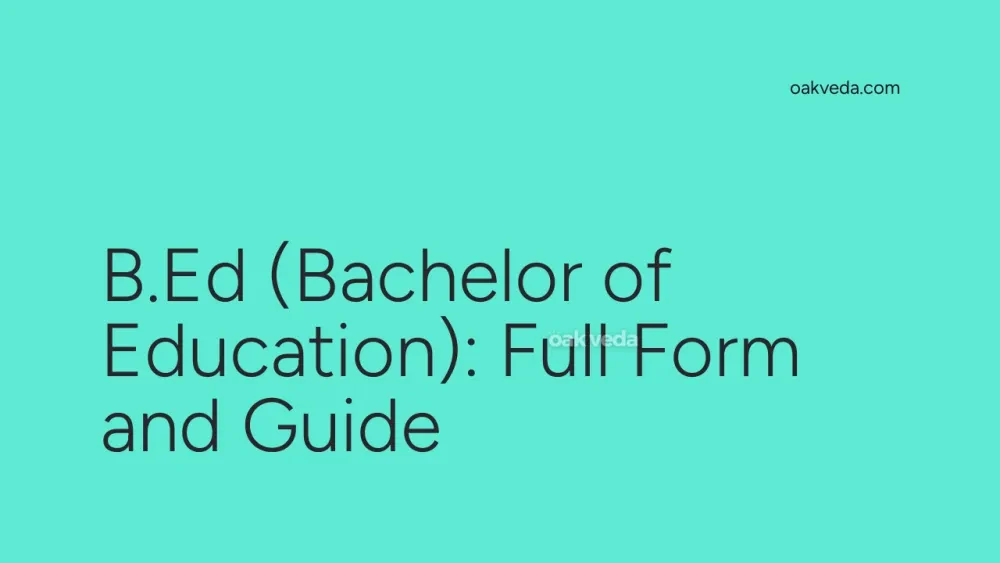
What is the Full Form of B.Ed?
The full form of B.Ed is Bachelor of Education. This undergraduate degree is a crucial stepping stone for individuals aspiring to pursue a career in teaching and related educational disciplines.
What is Bachelor of Education?
Bachelor of Education, commonly known as B.Ed, is a professional degree program designed to prepare students for a career in teaching. This course equips aspiring educators with the necessary skills, knowledge, and pedagogical techniques required to become effective teachers at the secondary and higher secondary levels.
Origin and Development of Bachelor of Education
The concept of formal teacher training has evolved significantly over the years. In India, the Bachelor of Education program was introduced to standardize and professionalize teacher education. The course has undergone several reforms to align with the changing needs of the education sector and to incorporate modern teaching methodologies.
How does the B.Ed Program Work?
The B.Ed program typically spans two years and combines theoretical knowledge with practical teaching experience. Students learn about educational psychology, teaching methodologies, curriculum development, and assessment techniques. The course also includes practice teaching sessions in real classroom settings, allowing students to apply their learning in practical scenarios.
Types of B.Ed Programs
While the core B.Ed program is standard, there are several specialized variants:
- Regular B.Ed
- Integrated B.Ed
- Distance B.Ed
- Special B.Ed (for teaching children with special needs)
Functions of Bachelor of Education
The primary functions of the B.Ed program include:
- Preparing qualified teachers for secondary and higher secondary schools
- Imparting pedagogical skills and teaching methodologies
- Developing understanding of child psychology and learning processes
- Fostering critical thinking and problem-solving abilities in future educators
Applications of B.Ed
The B.Ed degree finds applications in various educational settings:
- Teaching in government and private schools
- Curriculum development and educational planning
- Educational administration and management
- Teacher training and development programs
Features of Bachelor of Education
Key features of the B.Ed program include:
- Comprehensive curriculum covering various aspects of education
- Blend of theoretical knowledge and practical experience
- Focus on developing effective communication and leadership skills
- Emphasis on understanding diverse learning needs and inclusive education
Benefits of Pursuing B.Ed
Obtaining a B.Ed degree offers several advantages:
- Career Opportunities: It opens doors to various teaching and educational roles.
- Professional Growth: Enhances pedagogical skills and teaching effectiveness.
- Job Security: Teaching is a stable profession with consistent demand.
- Personal Development: Improves communication, leadership, and interpersonal skills.
- Social Impact: Provides an opportunity to shape future generations.
Eligibility Criteria for B.Ed
To pursue a B.Ed degree, candidates typically need to meet the following criteria:
- A bachelor's degree (BA, B.Sc, or B.Com) from a recognized university
- Minimum aggregate score of 50% in the qualifying examination (45% for reserved categories)
- Some institutions may conduct entrance exams for admission
B.Ed Course Specializations
The B.Ed program offers various specializations to cater to different subject areas and teaching interests:
- B.Ed in Biological Sciences
- B.Ed in Mathematics
- B.Ed in English
- B.Ed in Social Sciences
- B.Ed in Computer Science
- B.Ed in Information Technology
- B.Ed in Home Science
- B.Ed in Economics
- B.Ed in Sanskrit
- B.Ed in Geography
B.Ed Entrance Exams
Many universities and institutions conduct entrance exams for B.Ed admissions. Some prominent B.Ed entrance tests include:
- Himachal Pradesh University B.Ed Entrance Test
- Andhra Pradesh Education Common Entrance Test (AP EdCET)
- Allahabad University B.Ed Entrance Test
- Goa B.Ed Exam
- Punjab B.Ed Exam
- Uttar Pradesh Joint Entrance Test (UP JET)
Career Opportunities after B.Ed
A B.Ed degree opens up a wide range of career prospects in the education sector:
- School Teacher (Secondary and Higher Secondary levels)
- College Professor (after pursuing higher education)
- Educational Administrator
- Curriculum Developer
- Content Writer for educational materials
- Online Tutor
- Private or Home Tutor
- Educational Counselor
- Librarian in educational institutions
Limitations and Challenges of B.Ed
While B.Ed is a valuable degree, it does face some challenges:
- Increasing competition for teaching positions
- Need for continuous professional development to stay updated with evolving educational practices
- Varying quality of B.Ed programs across institutions
- Limited scope for specialization in niche subjects
Future Developments in B.Ed
The field of education is constantly evolving, and so is the B.Ed program. Future developments may include:
- Integration of technology and digital teaching methods in the curriculum
- Greater emphasis on inclusive education and special needs teaching
- Focus on developing 21st-century skills in future educators
- Incorporation of global educational practices and cross-cultural teaching methodologies
FAQs on B.Ed Full Form
-
What is the duration of the B.Ed program? The B.Ed program typically lasts for two years.
-
Can I pursue B.Ed through distance education? Yes, many universities offer B.Ed through distance learning mode.
-
Is B.Ed mandatory for teaching in India? B.Ed is mandatory for teaching at the secondary and higher secondary levels in most Indian schools.
-
Can I pursue M.Ed after B.Ed? Yes, M.Ed (Master of Education) is a natural progression after completing B.Ed.
-
Are there any age restrictions for pursuing B.Ed? While most universities don't have strict age limits, some may have upper age restrictions. It's best to check with individual institutions.
In conclusion, the Bachelor of Education (B.Ed) is a vital program for aspiring educators. It provides the necessary skills and knowledge to shape the future of education. As the educational landscape continues to evolve, the B.Ed program remains adaptable, ensuring that future teachers are well-equipped to meet the challenges of modern education.
You may be interested in:

